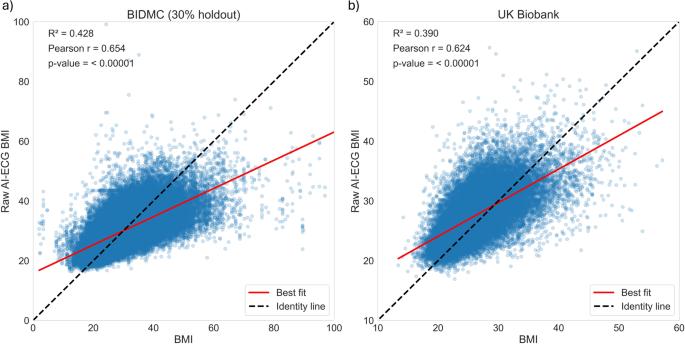人工智能增强心电图得出的体重指数作为未来心脏代谢疾病的预测指标。
IF 12.4
1区 医学
Q1 HEALTH CARE SCIENCES & SERVICES
引用次数: 0
摘要
心电图(ECG)可以捕捉与肥胖有关的心脏变化。人工智能增强心电图(AI-ECG)可以识别亚临床疾病。我们训练了一个人工智能心电图模型,仅通过心电图就能预测体重指数(BMI)。该模型是根据贝斯以色列女执事医疗中心(BIDMC)的 512,950 张 12 导联心电图(二级医疗机构队列)建立的,并在英国生物库(UKB)(n = 42,386)中进行了验证,在 BIDMC 队列和英国生物库中,AI-ECG BMI 与测量 BMI 的皮尔逊相关系数 (r) 分别为 0.65 和 0.62,R2 分别为 0.43 和 0.39。我们发现,delta-BMI,即测量的 BMI 与 AI-ECG 预测的 BMI(AI-ECG-BMI)之差,是心血管代谢健康的生物标志物。delta-BMI 的最高三分位数显示未来罹患心脏代谢疾病的风险增加(BIDMC:HR 1.15,p本文章由计算机程序翻译,如有差异,请以英文原文为准。

Artificial intelligence-enhanced electrocardiography derived body mass index as a predictor of future cardiometabolic disease
The electrocardiogram (ECG) can capture obesity-related cardiac changes. Artificial intelligence-enhanced ECG (AI-ECG) can identify subclinical disease. We trained an AI-ECG model to predict body mass index (BMI) from the ECG alone. Developed from 512,950 12-lead ECGs from the Beth Israel Deaconess Medical Center (BIDMC), a secondary care cohort, and validated on UK Biobank (UKB) (n = 42,386), the model achieved a Pearson correlation coefficient (r) of 0.65 and 0.62, and an R2 of 0.43 and 0.39 in the BIDMC cohort and UK Biobank, respectively for AI-ECG BMI vs. measured BMI. We found delta-BMI, the difference between measured BMI and AI-ECG-predicted BMI (AI-ECG-BMI), to be a biomarker of cardiometabolic health. The top tertile of delta-BMI showed increased risk of future cardiometabolic disease (BIDMC: HR 1.15, p < 0.001; UKB: HR 1.58, p < 0.001) and diabetes mellitus (BIDMC: HR 1.25, p < 0.001; UKB: HR 2.28, p < 0.001) after adjusting for covariates including measured BMI. Significant enhancements in model fit, reclassification and improvements in discriminatory power were observed with the inclusion of delta-BMI in both cohorts. Phenotypic profiling highlighted associations between delta-BMI and cardiometabolic diseases, anthropometric measures of truncal obesity, and pericardial fat mass. Metabolic and proteomic profiling associates delta-BMI positively with valine, lipids in small HDL, syntaxin-3, and carnosine dipeptidase 1, and inversely with glutamine, glycine, colipase, and adiponectin. A genome-wide association study revealed associations with regulators of cardiovascular/metabolic traits, including SCN10A, SCN5A, EXOG and RXRG. In summary, our AI-ECG-BMI model accurately predicts BMI and introduces delta-BMI as a non-invasive biomarker for cardiometabolic risk stratification.
求助全文
通过发布文献求助,成功后即可免费获取论文全文。
去求助
来源期刊

NPJ Digital Medicine
Multiple-
CiteScore
25.10
自引率
3.30%
发文量
170
审稿时长
15 weeks
期刊介绍:
npj Digital Medicine is an online open-access journal that focuses on publishing peer-reviewed research in the field of digital medicine. The journal covers various aspects of digital medicine, including the application and implementation of digital and mobile technologies in clinical settings, virtual healthcare, and the use of artificial intelligence and informatics.
The primary goal of the journal is to support innovation and the advancement of healthcare through the integration of new digital and mobile technologies. When determining if a manuscript is suitable for publication, the journal considers four important criteria: novelty, clinical relevance, scientific rigor, and digital innovation.
 求助内容:
求助内容: 应助结果提醒方式:
应助结果提醒方式:


